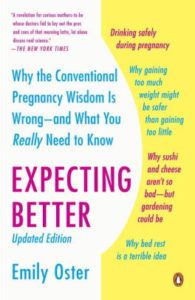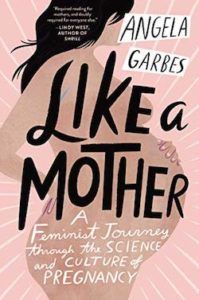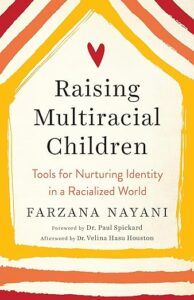This content contains affiliate links. When you buy through these links, we may earn an affiliate commission.
Last year, I became a first-time parent to identical twin girls. As my nurse/midwife will tell you, I’m someone who needs all of the information and data. But because I was living with the very real possibility that children wouldn’t happen for me, I avoided books about pregnancy and parenting until the day my husband and I saw (and were surprised by) two tiny beans on screen at our IVF clinic. After that day, I got on the internet and looked at ALL the lists. JK—as many who’ve Googled before me and will Google after do or will come to know, that’s an impossible feat. There is no end, it seems, to the market for books about parenting and pregnancy and so no end to the lists of books on this subject. As a first-time parent, I was completely overwhelmed by the options out there—I’m still overwhelmed.
That said, what I offer today is more of a personal look at a set of books and why they interest me as someone who very recently went through it and is trying to learn a lot but doesn’t have much spare time. I found it more helpful to get personal recommendations from stray conversations with my sisters-in-law who have small children, than it was to parse impersonal, random-feeling lists. I did end up getting some books off of those lists (particularly books about growing and raising twins) but found that many of them were dated or offered less substance and more smarmy platitudes than I was looking for.
The content I’ll talk about here I’ve either consumed or learned about through compelling sources. I’ll also take a detour into other media I’ve found helpful. This is nowhere near an exhaustive list—exhaustive is not where it’s at for the exhausted. While we’re here and in case you need to read this: take a nap instead of trying to read all the things. I promise it’ll be more beneficial.
I knew pretty immediately where my recommendations would begin in case you only got through part of this post before you were called away to other things. Emily Oster is a big name in parenting books, so you might have heard of her. If you haven’t, neither had I until I got pregnant, and noticed that a lot of the parents in my life that I admire follow her on Instagram. If you are confused by the widely varying recommendations given to pregnant folks and parents and are wondering if they’re backed by science, Oster is the data nerd for you.
I started with Expecting Better, which I read during pregnancy. When every other source shamed me for considering a second cup of coffee or staying open to formula, Oster, an economist whose career is centered around data and research, came through with a close look at the studies and said, actually, that’s a bunch of BS—enjoy that second cup (in more professional words) and don’t let the blogs tell you what’s best for you and your family. This is her approach: look at the data behind recommendations and panic headlines, translate them for the general audience, and give you the takeaways that you can apply to your life as you see fit. Knowing what the science actually said relieved a lot of my anxiety around day-to-day activities while I was pregnant. I also got to take an informed approach to doctor visits and was better able to articulate questions about my personal pregnancy experience based on what I was learning in Expecting Better.
My husband and I found the book so helpful that we picked up Oster’s book on parenting, Cribsheet: A Data-Driven Guide to Better, More Relaxed Parenting, from Birth to Preschool, and I’m a subscriber to her online resource, ParentData. She has a couple more books—The Family Firm: A Data-Driven Guide to Better Decision Making in the Early School Years and (available for preorder and out later this month) The Unexpected: Navigating Pregnancy During and After Complications, and I recommend following her on Instagram where she often debunks of-the-moment panic headlines for current and hopeful parents and conducts a weekly AMA that I find equal parts entertaining and informative.
Okay. Now I can admit that I did end up purchasing that ubiquitous pregnancy book: What to Expect When You’re Expecting by Heidi Murkoff. I expected to find a lot of judgment and dated information in that book (caveats always accompanied recs for this one), but I did actually find it useful to follow my pregnancy along on a monthly basis through the book and the app. The book leans harder into the benefits of breastfeeding than I think is necessary and it was interesting to read some of the advice in this book while learning about the data behind said advice in Expecting Better, but I’d still recommend this for expansive, general information about pregnancy. What I would not recommend is getting medical advice from the WTE forums, if you choose to use that tool. Some of the advice I encountered from initial perusals was wild.
As a sort of supplement to What to Expect (and I think this book is actually marketed as a supplement), I picked up Like a Mother: A Feminist Journey Through the Science and Culture of Pregnancy by Angela Garbes. A few years back, I read Thick By Tressie McMillan Cottom and a section of that book gave me my introduction to just how bad Black maternal mortality is in this country. Cottom talked about her own experience with doctors dismissing and downplaying her pain and the stats around Black maternal mortality. This is why I purposefully sought out books on pregnancy by people of color, and I’m disappointed to report that Black and Brown folks aren’t nearly as well represented—as authors, in the literature, the studies—you name it and we’re just catching up. Garbes is a Brown woman whose own pregnancy experience compelled her to look into “the emerging science and cultural myths of pregnancy.” Her book is how I learned about less discussed topics like the microbiome a baby inherits through vaginal delivery and options for C-section delivery, as well as delayed cord clamping. Garbes uses her skills as a journalist to dive into some of the oft-repeated myths and omissions that come from myriad sources, including medical professionals. If you, like me, want a pregnancy book that explicitly takes a feminist and more inclusive stance, check this one out. And if you love it, Garbes’ follow-up will take you from pregnancy into the hard work of parenting, oft made harder by policy and society, in Essential Labor: Mothering as Social Change.
Speaking of policy and society! While I was thumbing through WTE and listening to Like a Mother on Libro.fm, my husband was scouring the internet for books on pregnancy and parenting for non-birthing partners. I asked Brian if he had recommendations I could include here, knowing full well what his answer would be based on random comments he made while he started and stopped the dad-focused books he ended up with: “would not recommend.” Brian is, however, a big Ezra Klein fan and it happens that Klein has been talking a lot about parenting on his podcast, The Ezra Klein Show. Brian was looking into schools and thinking about parenting pretty early into the pregnancy (same same), so he was ready for even more of that content by the time the girls were delivered. “The Deep Conflict Between Our Work and Parenting Ideals” is the episode he was recently keen on sharing. I gave it a listen and found the conversation on policies around families and parenting to be as compelling as Brian described. For this exploration, Klein interviewed Caitlyn Collins, author of Making Motherhood Work: How Women Manage Careers and Caregiving.
I’m not new to the fact that the U.S. is far behind other developed countries when it comes to social support for families, but the depth of the problem was clarified when I became a parent myself. The cost of childcare alone makes me wonder how anyone but the wealthy can afford to start a family. We’re a country that does the least and acts like families should be grateful when small concessions, like promising 12 weeks of unpaid family leave to some, are made. It was galling to hear about how it’s done and how it works in other countries (well, mostly Sweden). Needless to say, I immediately put Collins’ book on my TBR. Collins recommended another read I added to my list: Mothering While Black: Boundaries and Burdens of Middle-Class Parenthood by Dawn Marie Dow. It hasn’t been easy to find research-based parenting books that focus on African American families, so I’m excited to dive in and find out what Dow learned about Black middle-class mothers and how their parenting strategies might apply to my life or give me some idea of what to expect.
The last few recommendations above are perhaps more intellectual than practical, so I’ll also be picking up Raising Multiracial Children: Tools for Nurturing Identity in a Racialized World by Farzana Nayani. This pick was quite honestly a Google find. I know vanishingly few parents raising multicultural babies and I needed somewhere to start. Nayani is a DEI specialist with Southeast Asian (represent!) ties—she seems like the right person for the job. I found navigating childhood and young adulthood as a biracial African American and Southeast Asian person confusing and isolating; I want to be informed and equipped to be a resource for my daughters when they have questions or face challenges.
Finally, the thing I felt lacking in all my reading and classes, was a straightforward, practical resource for taking care of our newborns in those first few months. I was like, okay, I understand my babies’ microbiomes but how do I literally take care of them? For those WTH am I doing moments, I recommend Moms on Call: Basic Baby Care 0-6 Months by Laura Hunter LPN and Jennifer Walker RN BSN. My doula recommended this book as I fretted about my first-time parent ignorance. It’s basically a collection of bullet point-style how-tos for the day-to-day tasks and challenges of caring for an infant. I ended up learning most of what I know about how to care for babies from the veteran nurses in the NICU who were AMAZING. This book offers some of that straightforward need-to-know information and I find it a helpful refresher and reference.
I hope these books offer a helpful starting place for you. I know there are so many more worthy reads out there. If you have any recommendations you or people in your life have found helpful, please comment with them! I’m always on the lookout. In fact, I see some on my nightstand right now. I’m gonna go grab one, rest my head on my pillow, and see what happens.
Find more posts like this via our subscription publication, Better Living Through Books, your resource for reading material that helps you live the life you want. From self-help to cookbooks to parenting to personal finance, relationships, and more, we’ve got you covered.



